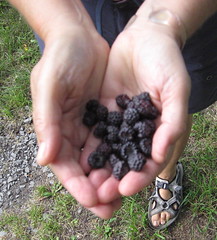My thinking on all this is definitely in process, but in the meantime, I have a small garden planted in the yard (quite popular with the rabbits), our vegetables and fruits are purchased from local growers and as much as is feasible, we are buying things made locally, even if we pay a slight premium.

Results of 1-minute's worth of berry picking
This all was brought to mind when I read a review of a book called The Future of Nature, a collection of essays on human ecology selected and introduced by Barry Lopez. The book looks at how it it that so many people live so sequestered from the outdoors. In one essay, one writer laments that our public schools have cut out natural history for the most part. And instead of first-hand experiences with nature, most things are second-hand - computer models, simulations or videos of other people have the experience.
I'm not suggesting that anyone should be required to have the experience of having a nest of angry yellow jackets right on your ass as you run across the yard to get away. But seeing a video of that fury - and living in it - are very different experiences.
(I think that's why those videos those they show in driver's education classes are generally ineffective with young drivers.)
I remember that several years ago, when a comet was passing by at about 4 a.m. one morning (and Admiral Fox rousted the family to watch it), both of our then-teenage sons said you could see it much better on their computer screens, through a livecam from NASA.
Good grief.
Another writer, (cited in an excellent review of the book written by Tom Murphy of Mansfield University and published in Mountain Home Magazine), says that what we call the environmental crisis is largely a result of us giving up control. With corporations and governments almost always being the ones taking care of our needs, they go for the cheapest way or product, where they will either save money for taxpayers (government) or be able to reap the biggest profit for shareholders (corporations).
Not to rag too much on the nation of China or the corporation of Wal-Mart, but I have been very disappointed - over and over - in the quality of most of the things I have been purchasing this summer, sold by Wal-Mart and made in China.
Tools fall apart after a couple of uses, electrical devices short out, and clothes only make it through the washing machine a couple of times.
Yes, the tools, electrical devices and clothes were very cheap to buy. Like Captain Ron says in the movie of the same name, "It shows."
A friend who owns a local auto dealership told us a few days ago he had found a garden rake for sale at Wal-Mart that was Made in the USA. He snatched it up quickly and has been showing it to all his friends, along with the three he had already purchased this summer that broke the first time he tried to put some muscle behind the handle. The USA model is still keeping his yard clean, he says.
The book is on my reading list for the summer, the perfect time to read it because the whole idea of eating, growing and buying locally is a lot easier to digest (sorry about the pun) in the summer. But even at that, the quarts of berries picked this morning will make their way into jars of jam to be enjoyed long after the winter snow has started flying here.
Perhaps I'll take The Future of Nature up in the woods and read it by the creek behind our house.
That will also force me to get off this computer and get out there in nature.

A great read place to sit and read









No comments:
Post a Comment